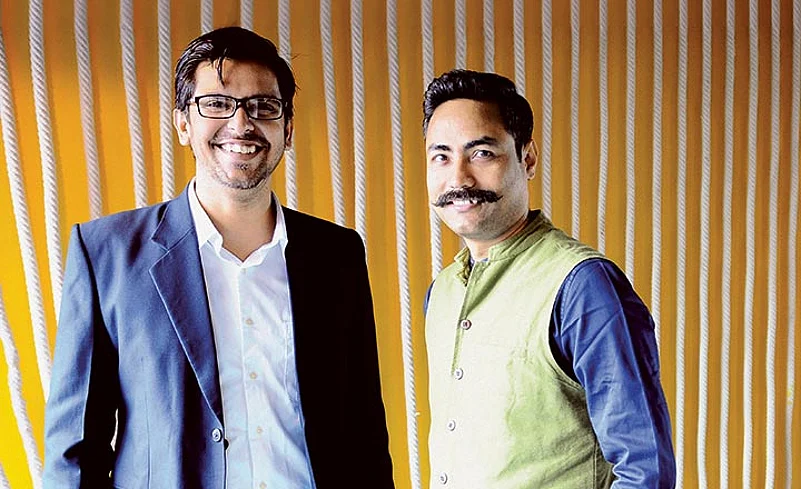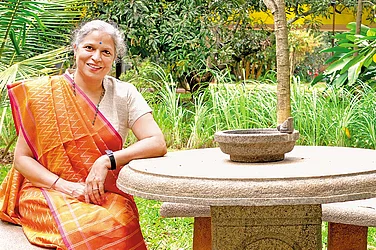Recall that time you were fumbling for change after buying a cigarette from the corner shop. While you were foraging in your wallet and pockets, another guy — a regular — may have stopped by, picked up the same cigarette and walked away, after a nod to the shopkeeper. How simple life would have been if payments were as simple as that nod! Bengaluru-based start-up, ToneTag believes it could be, with its technology.
From digital wallets and united-payments interface (UPI) to quick response (QR) codes, the digital payment ecosystem in India has been evolving. However, many of us have found ourselves in that embarrassing situation of not being able to make payments using our mobiles because of poor connectivity. Merchants are often left waiting long for a payment confirmation SMS, which may not even come during rush hours. They also stand a chance of being cheated by wily customers — who show a confirmation message from a previous transaction, to escape paying for the recent one. ToneTag is therefore working on a transaction method that neither requires an internet connection or a smartphone. All a buyer would need to do is ‘tap’ into the waves of natural sounds that surround us.
Tonetag’s software helps clients — such as payment gateways, banks or e-tailers — provide contactless, offline payments from one device to another in close proximity. It does not transfer money but transfers data over sound waves. Payment is only one of its potential uses. “We picked payments first because it is easy for people to relate to, and understand this technology through this,” says Kumar Abhishek, CEO and co-founder of ToneTag.
The start-up’s team is trying to patent its technology. “We are the only player in the world that enables communication between two machines — between two phones (even feature phones) or between a phone and another device, say a card swiping machine, toll plaza, an ATM machine or a vending machine — using sound waves,” says Abhishek. Near-field communication (NFC) too helps transfer data between two devices placed closed to each other, but uses radio-frequency waves and needs to be done online. Also, NFC does not work on feature phones.

“NFC requires an NFC chip to be installed in phones or machines, which drives up the cost. ToneTag’s soundwave technology does not require any additional instruments,” says Pavel Naiya, senior analyst, Counterpoint Research.
ToneTag’s software can be integrated with any machine — including a merchant’s phone or swipe machine — or with payment apps such as Amazon Pay or any phone banking app. If the merchant does not have a swipe machine, he or she can enter the bill amount in the merchant app and the user receives a pop up on his phone, which simply needs to be clicked for the payment to be completed.
Tonetag means to cater largely to Indians who have no access to smart phones or the internet, a large majority of 800 million. To make this possible, the team has ensured that the technology can also be integrated into feature phones. All the customer needs to do is dial 99 (an interactive voice response, or IVR, number) and tap the merchant’s device – smartphone, swipe machine or the Pod. The customer records the unique tone generated with each transaction, which is sent to ToneTag’s server, which decodes it and sends a notification to the issuer bank, which releases a confirmation to the merchant. Over 310,000 merchants now use ToneTag. In a day, the software is used in 40,000 transactions, all of which are offline.
A pre-revenue company till now (making revenues but investing everything back into technology development), ToneTag currently follows multiple business models. To the larger players, it sells the licence and charges a small fee per transaction. Smaller merchants are only charged per transaction. If merchants do ten transactions or more in a day using ToneTag, they are charged nothing. For any lesser number, they are charged Rs.1 per transaction. Abhishek hopes to cross the $10 mn revenue mark in three years.
Besides serving retail merchants such as stores and restaurants, ToneTag is also running pilots with ICICI Bank and First Data. The start-up also plans to widen the scope of its technology to retail and customer engagement. “Say you enter a restaurant. You have the ICICI app, the moment you launch it, you get a pop-up through which you could call the waiter, make payments and do things like that. We are almost there, we have run the pilot” says Abhishek. ToneTag’s technology has now crossed 52 million users.
The futuristic technology has attracted funding from payment and retail majors such as Mastercard and Amazon, as well as investors such as 3one4 Capital, Elevate Innovation Partners, Tropical Star, Reliance Capital’s Venture fund arm, T V Mohandas Pai, Anand Chandrasekaran and Deepak Ghaisas. The start-up that raised $2.2 million in its series A round in 2016, closed its series B of $8.1 million in 2018.
3one4 Capital came on board in series A round, soon after ToneTag’s incubation. Pranav Pai, founding partner at 3one4, says, “Our view was that there is far too much friction in how human beings communicate using machines and it was across multiple levels — during payments or when our card goes through a toll booth or how security check is done in a movie theatre. Fundamentally, we believed it is a big enough problem to be fixed.”
Deepak Ghaisas, chairman, Gencoval Strategic Services and one of the early investors in the company, says, “I liked the fact that Tonetag is going after a huge problem of solving the pain involved in payments today. That’s where the future of payments is headed.” He adds that his only concern is with the ambient noise at certain locations. “It can be loud and interfering,” he says, “but their technology ensures that the sound waves are encrypted in multiple layers of security.”
Started in 2013, ToneTag spent its initial three years in R&D and in demonstrating the technology to big partners for validation. “Our technology has been certified by many agencies (including Department of Industrial Policy and Promotion (DIPP), Nasscom and Federation of Indian Chambers of Commerce and Industry or FICCI).” Now, they want to accelerate the pace of adoption.
Naiya, believes that technology that enables one-touch payment will increase chances of digital payment over cash or cards. “ToneTag can definitely provide that kind of a product experience in Indian consumer space,” he says. However, Naiya adds that the consumer must be educated about this new technology too for faster adoption. “Players such as Google Pay also have Tez which is using sound wave, but in terms of usage it’s still very low. Users are not aware of this technology and digital payment happens when you are habituated with a process. Any start-up in payment system requires lot of partnership building and advertising to overcome penetration barriers,” says Naiya.
To increase the software’s adoption, Tonetag too had to come up with an innovation. It is an alternative to the swipe machine – a Retail Pod – which can read the data on the buyer’s phone and complete the transaction. It is not a technological necessity; it was introduced only to win over merchants who were hesitant about programming their swipe machines to integrate this technology. So, the team introduced this Pod (installed for a fee) and the usage went up. “We gave them this beautiful device and tell them to simply tap it. That made it more acceptable,” Abhishek says.
Demonetisation has helped. There is more awareness now about digital payments, and this has speeded up partnerships in India. “Lot of things converged at the right time, so Tonetag didn’t have to spend as much money as wallet companies did to educate customers,” says Pai. The government also introduced restrictions to cut down on cash transactions.
The currents are moving in its favour and the start-up has a strong tech team, says Pai. “They have studied the payment infrastructure end to end and come with a domain expertise, which we haven’t seen in another company before,” he says.
Abhishek has worked on Infosys’ core banking product, Finacle, and had a fair idea about the payment ecosystem and the gaps in it, and co-founder Vivek Kumar Singh had experience in financial services. Abhishek noticed how when making a payment through digital wallets, UPI or QR codes, there were multiple steps to be completed. After an offline purchase, a customer usually reaches for cash or a card. “If its a phone app, you have to open it, find the scanner, scan the code, wait for the SMS, enter the pin and get a confirmation SMS. A shopper would use the phone app only if there is an added benefit and, since these apps cannot provide anything better, they are giving cashbacks. But that is not sustainable,” he says. ToneTag’s solution takes all of three seconds for this process, from launch of its app to transaction confirmation.
While adoption is one challenge the team is working on, Pai thinks going global could be another. “The payment infrastructure gloabally is a highly networked one and is also very deeply monopolised. It is very hard to break into the system if you don’t know their language. But Abhishek, thankfully, coming from the domain, knows to speak in their language and have right partners (such as Amazon, First Data and so on) on board,” he says.
ToneTag is planning to enter Japan, the Asia Pacific region, Middle East, Srilanka and South Africa, where it already has partners. In these regions, it hopes to collaborate or co-exist with bigger players, rather than compete with them, since its technology is unique. Abhishek says they have filed under Patent Cooperation Treaty (PCT), which is applicable in around 85 countries.
With 22 partners, ToneTag is now eyeing 100 million consumers and 15 more partners by 2019. ”We will be there at every touch point for the consumer to make his experience more natural, starting with payments, then mobility and commerce. In commerce, we would be in retail and restaurants while, in mobility, we would be at tolls, in parking, and more,” says Abhishek.
Abhishek envisions ToneTag’s technology also helping retail outlets and restaurants engage in consumer connect initiatives. He hopes to have these out in the next 18 months.


























